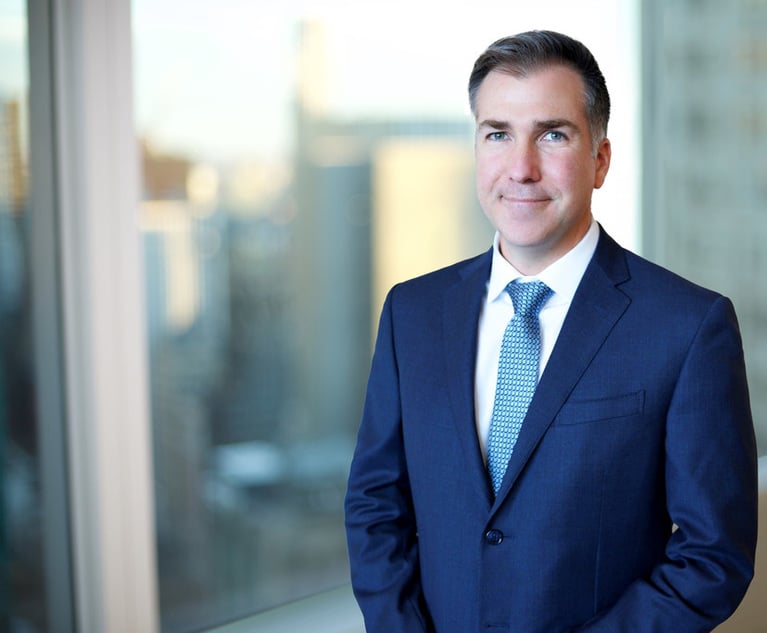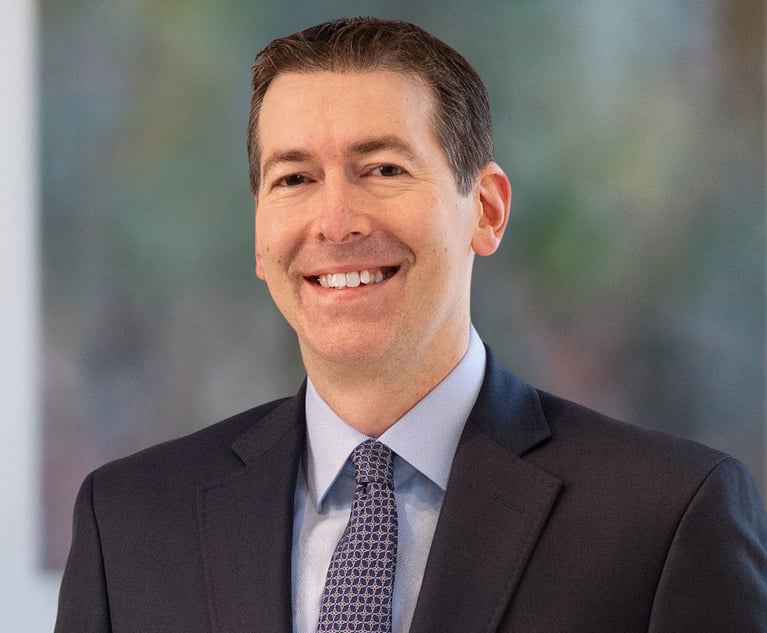NY Financial Regulator May Redistribute Federal Health Subsidy, US Judge Rules
The decision means the insurance company will likely have to pay $65 million to the state in the coming weeks unless the Second Circuit decides differently.
September 25, 2018 at 01:43 PM
6 minute read
 U.S. District Judge John Koeltl of the Southern District of New York. Photo: Rick Kopstein/ALM
U.S. District Judge John Koeltl of the Southern District of New York. Photo: Rick Kopstein/ALM
A federal judge has denied a demand from a health insurer that would prevent New York state regulators from redistributing federal risk adjustment funds to other insurers while the dismissal of their lawsuit against the state is appealed.
U.S. District Judge John Koeltl of the Southern District of New York said in a decision that a potential $65 million loss to United HealthCare is such a small fraction of its revenues that it may bear the cost of the regulation. He reasoned that without the rule, harm done to the insurance market may be greater.
The decision means the insurance company will likely have to pay that amount to the state in the coming weeks unless the U.S. Court of Appeals for the Second Circuit decides differently.
“The plaintiffs imply that no harm other than mere delay would result,” Koeltl wrote. “These entities—the ones that the 2017 [regulation] is intended to benefit—would continue to be harmed by the [federal risk adjustment program] methodology while not accruing the benefits accorded to them by the 2017 [regulation].”
Koeltl also said United was unlikely to succeed in its appeal of his decision dismissing their lawsuit in August, which is currently being reviewed by the Second Circuit.
Steven Rosenbaum, a partner at Covington & Burling, represented UHC in the case. He declined to comment on Koeltl's decision when reached by phone on Tuesday. A spokeswoman for UHC said in a statement that they are now planning to ask the Second Circuit for an injunction pending a decision on their appeal.
“We respectfully disagree with the court's decision and are appealing,” the spokeswoman said.
The company sued DFS last year for promulgating a regulation that allowed the agency to redistribute a portion of federal funds from the federal risk adjustment program that was implemented in New York by the U.S. Department of Health and Human Services.
A risk adjustment program requires insurers with healthier, and therefore less expensive, enrollees to pay into a common fund that is then distributed to insurers with less healthy, and therefore more expensive, enrollees. It's designed to prevent insurers from seeking out only the healthiest customers.
The federal program, or FRAP, was created as part of the Affordable Care Act. HHS developed the risk adjustment methodology for states under the program, which was finalized in 2016.
DFS issued an emergency regulation that year that allowed the agency to implement a risk adjustment program in New York if the federal program does not address the unique needs of the state's insured. The rule allows the agency to collect up to 30 percent of the funds received through FRAP and redistribute them to other insurers based on a methodology created by the state.
UHC claimed in its lawsuit last year that DFS unlawfully usurped the federal program through its regulation. The insurer argued that the rule amounted to an unconstitutional taking of their property in the form of FRAP funds.
Koeltl said in his decision dismissing the lawsuit in August that the HHS rules allow states to modify the federal program if they need to adapt it for their state's insurance market. Since the state is allowed to adjust the funding, according to HHS, it also has the authority to reallocate funds, Koeltl said.
UHC moved to appeal his decision and asked for a preliminary injunction less than two weeks later. It said in its filing that even if DFS wins the case on appeal to the Second Circuit, the worst harm done would be a delay in their payment to the agency.
An injunction would also allow it to save money it may not be able to recoup, United said. The company argued that it would have no legal avenue to recoup the funds taken by the state if it wins on appeal because the Eleventh Amendment prevents a federal court from ordering the state to refund money taken unlawfully after the fact.
Koeltl did not care much for those arguments in his decision. He briefly addressed the argument about the Eleventh Amendment and seemed to suggest the company could explore litigation in state court to recoup the funds, though he said that was not an option he could speak to.
Instead, he addressed the state's argument that United has more than enough money to balance the cost of the lost FRAP funding.
“The defendant points out that a potential $65 million dollar loss is a fraction of Oxford Health Insurance's anticipated 2017 total Federal Risk Adjustment receivable, which will be greater than $200 million,” Koeltl wrote. “And $65 million is but a small fraction of UnitedHealth Group's reported 2016 operating revenues, which totaled more than $184 billion. That potential loss is more than offset by the harm to the small insurance market in New York state if the state program is enjoined.”
UHC will have to pay the estimated $65 million within 10 days of receiving an invoice from the state, or when it receives its FRAP funds in October, whichever happens first. A decision from the Second Circuit granting a preliminary injunction could prevent the payment, but it's unclear if that will come before the funds are sought by the state.
Assistant Attorney General Kelly Munkwitz is the lead attorney on the case for the state.
READ MORE:
Lawsuit Dismissed Against DFS From UnitedHealthCare Over Risk Adjustment Payments
NY Financial Regulator Tightens Reins on Life Insurance Sales Practices
State Appeals Supreme Court Decision Reversing Title Insurance Regulation
This content has been archived. It is available through our partners, LexisNexis® and Bloomberg Law.
To view this content, please continue to their sites.
Not a Lexis Subscriber?
Subscribe Now
Not a Bloomberg Law Subscriber?
Subscribe Now
NOT FOR REPRINT
© 2025 ALM Global, LLC, All Rights Reserved. Request academic re-use from www.copyright.com. All other uses, submit a request to [email protected]. For more information visit Asset & Logo Licensing.
You Might Like
View All
Attorneys ‘On the Move’: O’Melveny Hires Former NBA Vice President; MoFo Adds Venture Capital Partner
5 minute read
Orrick Hires Longtime Weil Partner as New Head of Antitrust Litigation

Ephemeral Messaging Going Into 2025: The Messages May Vanish but Not the Preservation Obligations
5 minute read
Trending Stories
- 1Inherent Diminished Value Damages Unavailable to 3rd-Party Claimants, Court Says
- 2Pa. Defense Firm Sued by Client Over Ex-Eagles Player's $43.5M Med Mal Win
- 3Losses Mount at Morris Manning, but Departing Ex-Chair Stays Bullish About His Old Firm's Future
- 4Zoom Faces Intellectual Property Suit Over AI-Based Augmented Video Conferencing
- 5Judge Grants TRO Blocking Federal Funding Freeze
Who Got The Work
J. Brugh Lower of Gibbons has entered an appearance for industrial equipment supplier Devco Corporation in a pending trademark infringement lawsuit. The suit, accusing the defendant of selling knock-off Graco products, was filed Dec. 18 in New Jersey District Court by Rivkin Radler on behalf of Graco Inc. and Graco Minnesota. The case, assigned to U.S. District Judge Zahid N. Quraishi, is 3:24-cv-11294, Graco Inc. et al v. Devco Corporation.
Who Got The Work
Rebecca Maller-Stein and Kent A. Yalowitz of Arnold & Porter Kaye Scholer have entered their appearances for Hanaco Venture Capital and its executives, Lior Prosor and David Frankel, in a pending securities lawsuit. The action, filed on Dec. 24 in New York Southern District Court by Zell, Aron & Co. on behalf of Goldeneye Advisors, accuses the defendants of negligently and fraudulently managing the plaintiff's $1 million investment. The case, assigned to U.S. District Judge Vernon S. Broderick, is 1:24-cv-09918, Goldeneye Advisors, LLC v. Hanaco Venture Capital, Ltd. et al.
Who Got The Work
Attorneys from A&O Shearman has stepped in as defense counsel for Toronto-Dominion Bank and other defendants in a pending securities class action. The suit, filed Dec. 11 in New York Southern District Court by Bleichmar Fonti & Auld, accuses the defendants of concealing the bank's 'pervasive' deficiencies in regards to its compliance with the Bank Secrecy Act and the quality of its anti-money laundering controls. The case, assigned to U.S. District Judge Arun Subramanian, is 1:24-cv-09445, Gonzalez v. The Toronto-Dominion Bank et al.
Who Got The Work
Crown Castle International, a Pennsylvania company providing shared communications infrastructure, has turned to Luke D. Wolf of Gordon Rees Scully Mansukhani to fend off a pending breach-of-contract lawsuit. The court action, filed Nov. 25 in Michigan Eastern District Court by Hooper Hathaway PC on behalf of The Town Residences LLC, accuses Crown Castle of failing to transfer approximately $30,000 in utility payments from T-Mobile in breach of a roof-top lease and assignment agreement. The case, assigned to U.S. District Judge Susan K. Declercq, is 2:24-cv-13131, The Town Residences LLC v. T-Mobile US, Inc. et al.
Who Got The Work
Wilfred P. Coronato and Daniel M. Schwartz of McCarter & English have stepped in as defense counsel to Electrolux Home Products Inc. in a pending product liability lawsuit. The court action, filed Nov. 26 in New York Eastern District Court by Poulos Lopiccolo PC and Nagel Rice LLP on behalf of David Stern, alleges that the defendant's refrigerators’ drawers and shelving repeatedly break and fall apart within months after purchase. The case, assigned to U.S. District Judge Joan M. Azrack, is 2:24-cv-08204, Stern v. Electrolux Home Products, Inc.
Featured Firms
Law Offices of Gary Martin Hays & Associates, P.C.
(470) 294-1674
Law Offices of Mark E. Salomone
(857) 444-6468
Smith & Hassler
(713) 739-1250






